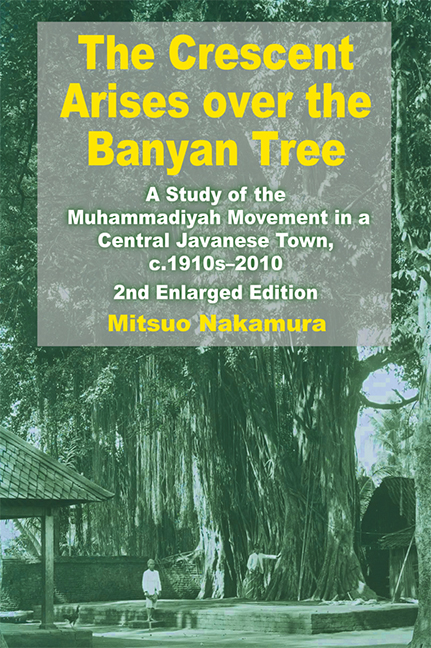 The Crescent Arises over the Banyan Tree
The Crescent Arises over the Banyan Tree Book contents
- Frontmatter
- Dedication
- Epigraph
- Contents
- List of Figures and Maps
- List of Tables
- List of Boxes
- Foreword to the Second Edition
- Preface to the Second Edition
- Foreword to the First Edition
- Preface to the First Edition
- Notes
- Map
- PART I DEVELOPMENT OF THE MUHAMMADIYAH IN KOTAGEDE, c.1910s–1972
- PART II KOTAGEDE REVISITED, 1972–2010
- Epigraph
- Map
- Introduction to Part II
- 8 Social Changes in Kotagede, 1972–2010
- 9 The Achievements of the Muhammadiyah
- 10 Internal Dynamics of the Muhammadiyah Movement
- 11 Challenges Facing the Muhammadiyah
- 12 Festival Kotagede: Conflict and Integration
- 13 The May 2006 Earthquake and Reconstruction of Kotagede
- 14 Concluding Remarks: Future of the Muhammadiyah
- Postscript to Part II
- Bibliography
- Glossary
- Appendices
- Index
- About the Author
12 - Festival Kotagede: Conflict and Integration
from PART II - KOTAGEDE REVISITED, 1972–2010
Published online by Cambridge University Press: 21 October 2015
- Frontmatter
- Dedication
- Epigraph
- Contents
- List of Figures and Maps
- List of Tables
- List of Boxes
- Foreword to the Second Edition
- Preface to the Second Edition
- Foreword to the First Edition
- Preface to the First Edition
- Notes
- Map
- PART I DEVELOPMENT OF THE MUHAMMADIYAH IN KOTAGEDE, c.1910s–1972
- PART II KOTAGEDE REVISITED, 1972–2010
- Epigraph
- Map
- Introduction to Part II
- 8 Social Changes in Kotagede, 1972–2010
- 9 The Achievements of the Muhammadiyah
- 10 Internal Dynamics of the Muhammadiyah Movement
- 11 Challenges Facing the Muhammadiyah
- 12 Festival Kotagede: Conflict and Integration
- 13 The May 2006 Earthquake and Reconstruction of Kotagede
- 14 Concluding Remarks: Future of the Muhammadiyah
- Postscript to Part II
- Bibliography
- Glossary
- Appendices
- Index
- About the Author
Summary
THE BEGINNING: SUCCESS OF FESTIVAL KOTAGEDE 99
Efforts for the revitalization of local culture and arts have been realized in a series of community events called the Festival Kotagede (FK) held in 1999, 2000, and 2002. Those events have reflected internal dynamics within the local community in which the Muhammadiyah has occupied a significant position. The Muhammadiyah as an organization did not participate in the events. But, it became an informal stakeholder since its members were divided into two opposing groups — one group promoted the festival while the other criticized some of the programmes of the FKs. The events have given serious and meaningful lessons to the Muhammadiyah in terms of its relationship with local culture and arts in particular and its overall relationship with the diversifying local community.
Furthermore, the events were extremely significant in many ways beyond local context. From a national perspective, FK seems to be inseparable from the nationwide atmosphere of the Reformasi. Certainly, the removal of President Soeharto from the top of the power structure opened up a Pandora's box including culture: freedom of cultural expression went hand in hand with the guarantee of political freedom. PAN, PDI-P, Golkar, PKB, and other political groups were now free to express sub-cultures of their own respective constituencies in election campaigns. Also, with the advancement of regional autonomy, the provincial and municipal governments of Yogyakarta have become more active in promoting tourism on their own initiatives than before. International attention and cooperation has also become much wider and more active than before as indicated by the funding provided by the World Bank. Those factors all worked in favour of the FK. In a sense, the FK was a local celebration and appreciation of the Reformasi.
Therefore, it is understandable that two serious studies have already been made on FK, one by a university student1 native of Kotagede and the other, by an experienced outside observer. Brosur Lebaran has also taken up the events on several times. I shall rely on these sources when describing and discussing the events.
The actual beginning of the FK was made by the meeting of two actions: (1) an inventory of local cultural and artistic activities taken by Erwito Wibowo in 19994 and (2) the offer of a small grant from the World Bank for the promotion of local culture.
- Type
- Chapter
- Information
- The Crescent Arises over the Banyan TreeA Study of the Muhammadiyah Movement in a Central Javanese Town, c.1910s-2010 (Second Enlarged Edition), pp. 341 - 354Publisher: ISEAS–Yusof Ishak InstitutePrint publication year: 2012


